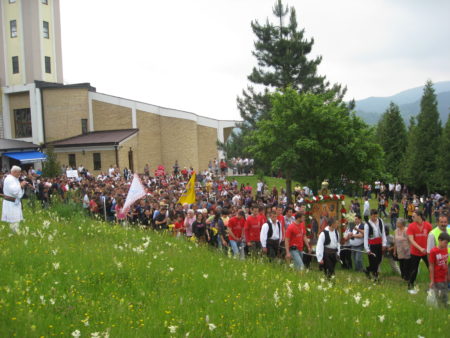Catholic minority in Bosnia Herzegovina suffers heavy discrimination
BOSNIA AND HERZEGOVINA has long since disappeared from the headlines. Officially, the brutal civil war in the former Yugoslavia ended with the signing of the Dayton Accords in 1995. But the wounds of the war are still very much in evidence–particularly in the discrimination of Catholics. During the conflict, at least half of the country’s former Catholic population of more than half a million was driven out, according to the Roman Catholic Archdiocese of Vrhbosna.

Cardinal Vinko Puljic, the local archbishop, has again raised the alarm about the fate of Catholics in the country, most of whom are Croats. An estimated 10,000 Catholics are emigrating each year. The cardinal recently spoke with us:
What is the current situation of the Catholics in Bosnia and Herzegovina?
During the war and its immediate aftermath, most of the Catholics were expelled from their homes and there was a great deal of destruction and looting. After the war there was neither political nor financial support to allow for the faithful’s return. The Dayton Accords were not implemented in practice, and those who suffered most were the Catholic Croat minority. It is harder for them to defend their basic rights. The resulting insecurity is evident today among the people, some of whom are leaving the country for this reason. They are concerned for the future of their children.
What is alarming them the most?
There are no equal rights for them in those areas where the Catholic minority finds itself confronted with a majority of the other ethnic groups [the Muslims and Serbian Orthodox]. Discrimination is expressed in political and administrative terms, above all where employment is concerned. There is reason to be seriously concerned for the future. If there were no more Croats left there, then there would also be no more Catholics.
Any positive signs?
The Church in our country is trying to operate as though everything is normal; we are trying to convey a sense of confidence and hope for the future. This is being done through our pastoral and charitable work and also through our school system. We must be the salt of the earth in this situation and stand up for human dignity and human rights.
How are the Christians contributing to overcoming the aftermath of the war?
It is a great grace to live out our faith. We draw hope and strength from communal and personal prayer. The Sunday Mass and our pilgrimages are an important source of strength. Jesus came to us in the reality of our human situation, and therefore we should experience Christmas in all its reality. In the birth of Jesus as a child we are called to acknowledge God’s love as the true source of our joy. For we are all creatures loved by God.
Just as God came close to us as Emmanuel, as “God with us,” so we too must draw closer to one another and closer to God. It is a matter of healing wounds—by forgiving one another and entrusting ourselves with joy to the love of God.

